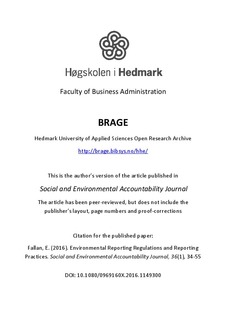| dc.contributor.author | Fallan, Even | |
| dc.date.accessioned | 2017-03-02T12:24:55Z | |
| dc.date.available | 2017-03-02T12:24:55Z | |
| dc.date.issued | 2016 | |
| dc.identifier.uri | http://hdl.handle.net/11250/2432744 | |
| dc.description.abstract | This study explores how four different types of environmental reporting regulations affect reporting practices. Accounting Act requirements, accounting standard requirements, accounting standard recommendations, and no regulation/voluntary disclosure are associated with different levels of reporting obligations. Disclosures made by enterprises subject to regulations are compared with those of enterprises that are not. There are separate regression models for each type of regulation. The sample consists of 235 enterprises from the private and public sectors. Content analysis is used to measure environmental disclosure.
Enterprises subject to regulations report significantly more types of the information content required by law than other enterprises, which is in line with the higher regulatory legitimacy risk. There is no such difference in disclosure between the two groups of enterprises for the information required and recommended by the accounting standard. This may suggest that pragmatic, cognitive, and moral legitimacy issues outweigh the regulatory legitimacy risk for these types of information, or that legitimacy risks are generally low. Enforcement of regulations will increase the regulatory risk. For information that is voluntary for all enterprises to disclose, enterprises that are not subject to any regulations report significantly more types of information than those that are. This result is not in line with predictions made from any of the four types of legitimacy. Some alternative explanations are discussed.
Since regulatory regimes may include several types of means, the main contribution is the comparison of four types of regulations within the same regime, as opposed to analysing only one type of regulation at a time such as in the extant literature. The study also explores different types of legitimacy, and addresses the lack of research on environmental reporting in the public sector. | nb_NO |
| dc.description.sponsorship | This work has benefitted from the support of the foundations Stiftelsen Den Nordenfjeldske Handelshøyskole and Adolf Øiens Fond. | nb_NO |
| dc.language.iso | eng | nb_NO |
| dc.publisher | Taylor and Francis | nb_NO |
| dc.rights | Attribution-NonCommercial-NoDerivatives 4.0 Internasjonal | * |
| dc.rights.uri | http://creativecommons.org/licenses/by-nc-nd/4.0/deed.no | * |
| dc.subject | regulation versus voluntarism | nb_NO |
| dc.subject | environmental reporting | nb_NO |
| dc.subject | pragmatic | nb_NO |
| dc.subject | cognitive | nb_NO |
| dc.subject | moral and regulatory legitimacy | nb_NO |
| dc.subject | Accounting Act | nb_NO |
| dc.subject | accounting standard and voluntary disclosure | nb_NO |
| dc.subject | public and private sector | nb_NO |
| dc.title | Environmental Reporting Regulations and Reporting Practices | nb_NO |
| dc.type | Journal article | nb_NO |
| dc.type | Peer reviewed | nb_NO |
| dc.subject.nsi | VDP::Samfunnsvitenskap: 200 | nb_NO |
| dc.source.pagenumber | 34-55 | nb_NO |
| dc.source.volume | 36 | nb_NO |
| dc.source.journal | Social and Environmental Accountability Journal | nb_NO |
| dc.source.issue | 1 | nb_NO |
| dc.identifier.doi | 10.1080/0969160X.2016.1149300 | |

